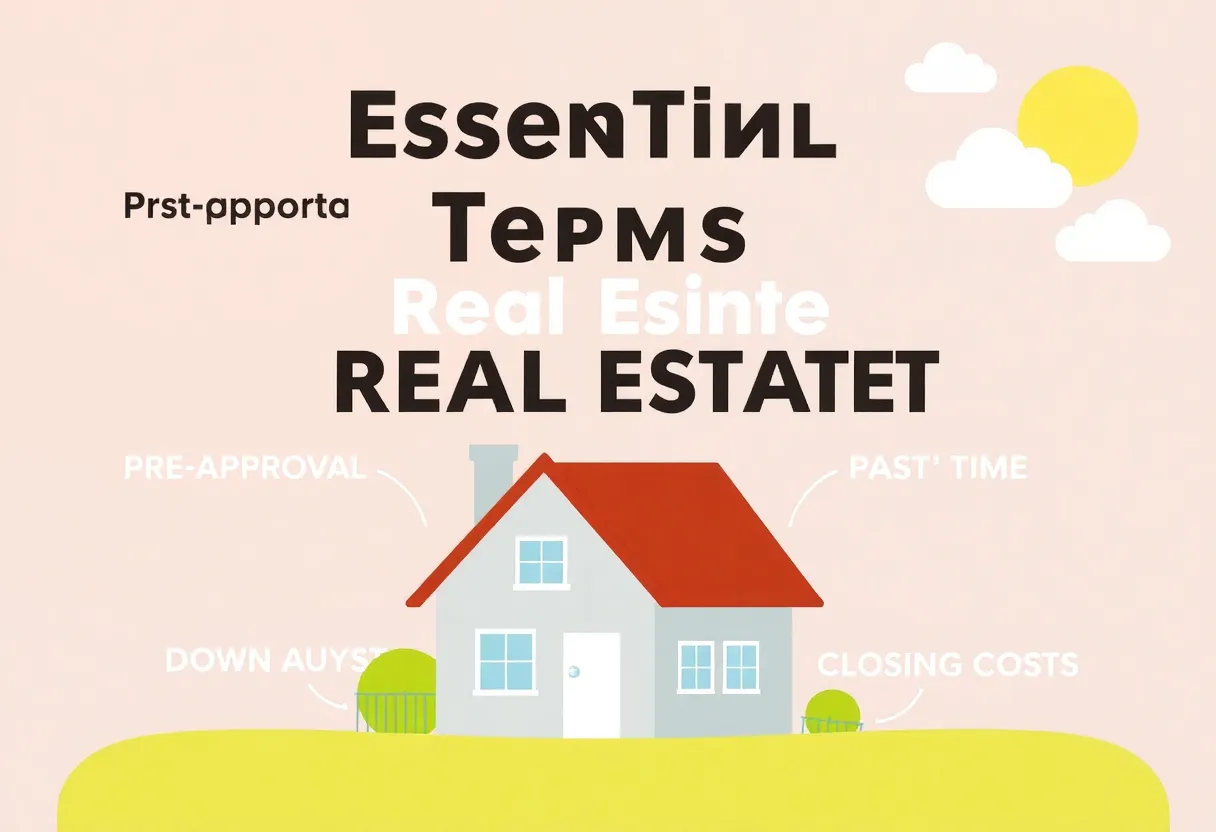10 Essential Real Estate Terms Every First-Time Homebuyer Should Know
Purchasing your first home marks a major milestone and brings an element of excitement mixed with complexity. The real estate market operates on a specialized language that can seem daunting without proper understanding. Grasping key terminology is essential for making informed decisions, negotiating effectively, and avoiding surprises during the process. Here, we delve into ten of the most critical real estate terms every first-time homebuyer must understand.
1. Pre-Approval
Pre-approval is the initial step in securing financing for a home purchase. It involves a lender reviewing your financial documents—such as income statements, credit score, and debt levels—to determine how much they are willing to lend you. This process provides a specific loan amount and demonstrates your seriousness to sellers. An official pre-approval letter boosts your position in competitive markets, signaling to sellers that you are a committed buyer capable of closing quickly.
2. Down Payment
The down payment is the upfront sum of money you pay toward your home’s purchase price. Conventional wisdom suggests setting aside 20% of the home’s price; however, various loan programs now permit significantly lower down payments—sometimes as low as 3.5%. A higher down payment can reduce your mortgage balance, favorably impact your interest rate, and potentially eliminate additional insurance requirements like PMI.
3. Closing Costs
closing costs encompass a range of fees necessary to finalize a real estate transaction. These typically include lender fees (like loan origination and underwriting), title services, appraisal and inspection fees, property taxes, and homeowners insurance premiums. Usually representing 2% to 5% of the home’s purchase price, they can substantially increase your initial outlay. Planning for these costs ensures smooth settlement and prevents funding shortfalls.
4. Earnest Money
Earnest money functions as a demonstration of your commitment to purchase. It’s a deposit made when submitting an offer, usually held in escrow. This amount—often ranging from 1% to 3% of the purchase price—is applied toward your closing costs or down payment. Should you back out for a valid reason, earnest money is typically refunded. However, if you withdraw without cause, the seller may retain it as liquidated damages, underscoring its importance.
5. Appraisal
An appraisal provides an impartial estimate of a property’s fair market value. Conducted by a licensed appraiser, this evaluation confirms the home’s worth relative to the loan amount. If the appraisal is below the purchase price, you may need to negotiate a lower price or supply extra cash. Conversely, a higher appraisal can strengthen your position, supporting loan approval and potentially reducing your down payment.
6. Home Inspection
A home inspection offers an in-depth evaluation of the property’s condition. Conducted by licensed inspectors, it assesses structural elements, electrical systems, plumbing, HVAC, and more. While optional, this step is highly regarded among buyers to uncover issues that might affect safety, value, or future expenses. Identified problems can become leverage for negotiations or lead to repairs before closing.
7. Contingencies
Contingencies are contractual clauses that protect the buyer by allowing them to back out or renegotiate under specified conditions. Common contingencies include the home inspection, financing approval, and appraisal. If these conditions are unmet, the buyer can withdraw without penalty, safeguarding against unforeseen risks and ensuring protection during negotiations.
8. Escrow
Escrow refers to a neutral third-party process where funds and documents are held securely until all contractual terms are fulfilled. Usually managed by a title company or attorney, escrow accounts ensure that neither party performs prematurely. The funds, earnest money, and necessary documents are disbursed at closing, enabling a safe transfer of ownership with minimal risk.
9. Private Mortgage Insurance (PMI)
Private Mortgage Insurance (PMI) is a safeguard required by lenders when a borrower’s down payment is less than 20%. PMI protects the lender, not the borrower, against default risk. It adds to the monthly mortgage payment until the borrower accrues enough equity—typically 20%—at which point PMI can be canceled. This added cost is an important factor for buyers planning to put down less than 20%.
10. Fixed-Rate Mortgage
A fixed-rate mortgage means the interest rate remains unchanged throughout the loan’s duration. Consequently, your monthly payments stay consistent, providing predictability and budget stability over time. This stability makes fixed-rate mortgages especially appealing to first-time buyers who prioritize payment certainty amid fluctuating economic conditions.
Key Takeaways
- Understanding these terms enhances confidence in navigating the homebuying process.
- Proper knowledge helps in negotiating and avoiding costly mistakes.
- Being informed provides clarity on what to expect at each phase, from pre-approval to closing.
Frequently Asked Questions (FAQ)
What is the difference between pre-approval and pre-qualification?
Pre-approval involves a lender’s formal review of your financial documents, resulting in a specific loan amount. Pre-qualification is a preliminary, less detailed assessment based on self-reported information, providing a general estimate of your borrowing capacity.
How much earnest money is typically required?
Earnest money deposits usually range from 1% to 3% of the home’s purchase price. The exact amount is negotiable and influenced by regional norms and market competitiveness.
Is a home inspection mandatory?
While not legally required, a home inspection is highly recommended. It provides critical insights into the property’s condition and can inform negotiations or repairs before closing.
What does escrow mean in a real estate transaction?
Escrow involves a neutral third party holding funds and documents until all contractual conditions are satisfied, ensuring a secure transfer of ownership.
How can I avoid paying Private Mortgage Insurance (PMI)?
Aim to make a down payment of at least 20% of the purchase price or explore loan programs that do not require PMI, though these may have other qualifications or costs.
Visual Summary: Key Features of the Homebuying Process
| Term | Definition | Significance |
|---|---|---|
| Pre-Approval | Formal lender assessment of borrower’s financial capacity | Strengthens offers; indicates affordability |
| Down Payment | Initial upfront payment towards the home’s price | Reduces loan amount; impacts PMI |
| Closing Costs | Fees involved in finalizing the sale | Initial cost; 2-5% of purchase price |
| Earnest Money | Deposit showing commitment | Part of down payment; risk management |
| Appraisal | Professional estimate of market value | Ensures loan security; affects purchase terms |
| Home Inspection | Thorough evaluation of property condition | Identifies issues; informs negotiations |
| Contingencies | Conditions that must be met | Provides exit options; reduces risk |
| Escrow | Neutral holding of funds/documents | Secures transaction; protects both parties |
| Private Mortgage Insurance (PMI) | Insurance for low-down-payment loans | Additional monthly cost; cancels after equity threshold |
| Fixed-Rate Mortgage | Interest rate unchanged over loan term | Payment stability; predictability |
Author: STAFF HERE HOUSTON TX WRITER
The HOUSTON STAFF WRITER represents the experienced team at HEREHouston.com, your go-to source for actionable local news and information in Houston, Harris County, and beyond. Specializing in "news you can use," we cover essential topics like product reviews for personal and business needs, local business directories, politics, real estate trends, neighborhood insights, and state news affecting the area—with deep expertise drawn from years of dedicated reporting and strong community input, including local press releases and business updates. We deliver top reporting on high-value events such as Houston Livestock Show and Rodeo, Art Car Parade, and Chevron Houston Marathon. Our coverage extends to key organizations like the Greater Houston Partnership and Houston Area Urban League, plus leading businesses in energy and healthcare that power the local economy such as ExxonMobil, Schlumberger, and Houston Methodist. As part of the broader HERE network, including HEREAustinTX.com, HERECollegeStation.com, HEREDallas.com, and HERESanAntonio.com, we provide comprehensive, credible insights into Texas's dynamic landscape.





